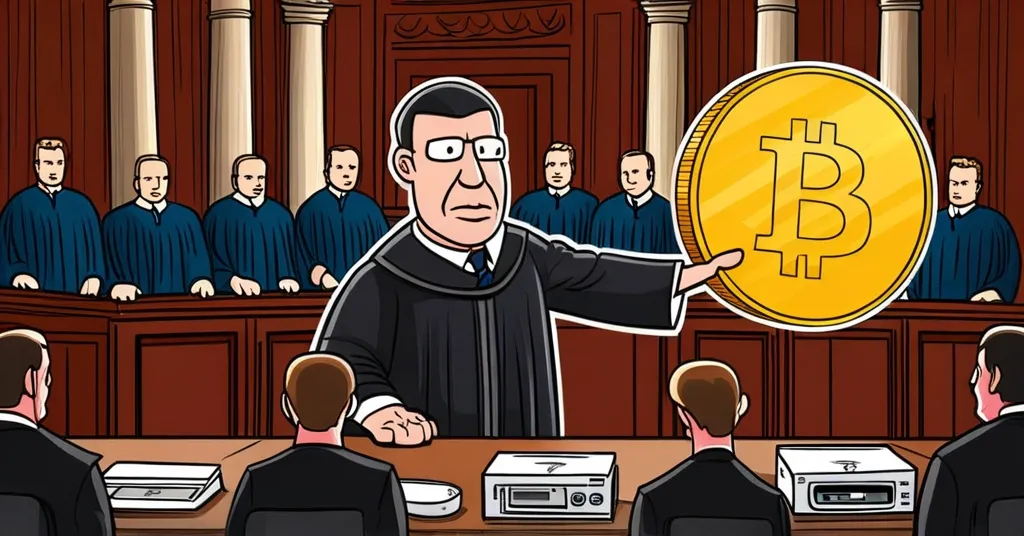Russia Sells $10M of Seized Bitcoin Amid Legal Battles and Bribery Trends

Moscow Bitcoin Selloff: Russia Begins to Sell Coins Seized in BTC 1,032 Infraud Haul
Russia has embarked on the sale of Bitcoin confiscated from Marat Tambiev, a former investigator convicted in a major bribery scandal involving the Infraud hacker group. The initial sale of nearly $10 million in Bitcoin marks the start of liquidating assets from a total seizure of BTC 1,032.1, shedding light on the complexities of cryptocurrency in legal contexts and the growing trend of non-cash bribery in Russia.
- Russia selling Bitcoin seized from former investigator
- Initial sale worth nearly $10 million
- Legal challenges and broader bribery trends
The case centers on Marat Tambiev, a former employee of Russia’s Investigative Committee, who was sentenced to 16 years in prison and fined 500 million rubles (about $5 million) for accepting a colossal bribe of 2,718 BTC from the Infraud Organization. This group, comprising hackers from Kazakhstan and Estonia, bribed Tambiev to manipulate legal outcomes and protect their cryptocurrency holdings. The seized Bitcoin, totaling 1,032.1 BTC, was kept on a Ledger Nano X, a secure hardware wallet used to store cryptocurrencies.
The sale process has been fraught with legal challenges, primarily because Tambiev divided the Bitcoin into smaller segments, necessitating separate court rulings for each piece. This initial sale of around 103 BTC, valued at roughly $10 million, is only the beginning. Prosecutors are eyeing further sales of Bitcoin, alongside real estate in the Moscow region and a Honda motorcycle, all part of Tambiev’s ill-gotten gains.
Shagaban Kubanov, Tambiev’s uncle, is also entangled in the legal proceedings aimed at liquidating these assets, adding a familial dimension to this intricate case. Meanwhile, Tambiev’s former colleague, Kristina Lyakhovenko, and Dmitry Gubin, another implicated official currently in hiding, further complicate the narrative.
This case is not an isolated incident but part of a larger trend in Russia, where non-cash bribery using cryptocurrencies is on the rise. Marina Odintsova, head of the Kirov branch of the Association of Lawyers of Russia, has noted this uptick, highlighting the digital twist on an age-old problem and the challenges it poses to the legal system.
The implications of this case extend beyond the immediate legal proceedings. As Russia navigates the intersection of cryptocurrency and crime, it serves as a stark reminder of the potential for digital assets to be used in nefarious activities. This is a wake-up call for regulators and crypto enthusiasts alike, underscoring the need for robust systems to monitor and control the flow of cryptocurrencies.
Moreover, the sale of such a significant chunk of Bitcoin could send ripples through the market, potentially causing a supply shock. It’s a delicate balance between recovering stolen assets and maintaining market stability, a challenge that regulators and crypto markets must address head-on.
In the world of crypto, where decentralization, privacy, and disruption of the status quo are championed, cases like Tambiev’s highlight the double-edged sword of innovation. While Bitcoin and other cryptocurrencies offer unprecedented freedom and the promise of financial revolution, they also demand vigilance and responsibility to prevent their misuse in criminal activities. It’s a reminder that as we push for “effective accelerationism” (e/acc) in the financial sector, we must remain grounded in the realities of crime and corruption.
Key Takeaways and Questions
- What prompted Russia to sell the seized Bitcoin?
Russia initiated the sale to convert the seized assets from Marat Tambiev, who was convicted of bribery, into fiat currency.
- How much Bitcoin is Russia selling initially?
Russia is initially selling nearly $10 million worth of Bitcoin, which amounts to approximately 103 BTC.
- What legal challenges are complicating the sale of the entire Bitcoin seizure?
The legal hurdles stem from Tambiev dividing the Bitcoin into smaller amounts, necessitating separate court rulings for each portion.
- What other assets are prosecutors planning to sell?
In addition to Bitcoin, prosecutors plan to sell real estate in the Moscow region and a Honda motorcycle.
- What broader trend does this case highlight in Russia?
The case reflects a growing trend of non-cash bribery using cryptocurrencies in Russia.
- What are the implications of this case for the use of cryptocurrencies in criminal activities?
It underscores the potential for cryptocurrencies to be used in corruption and bribery, prompting increased scrutiny and regulation in criminal contexts.
This case serves as a critical lesson in the crypto space. While we celebrate the potential of Bitcoin and blockchain to disrupt traditional finance and foster greater decentralization, we must also remain vigilant against the darker sides of this technological revolution. As we advocate for freedom, privacy, and the disruption of the status quo, let’s not lose sight of the need for responsible use and robust safeguards against misuse. After all, in the world of crypto, the only constant is change, and we must be ready to adapt and evolve.



